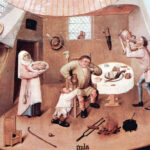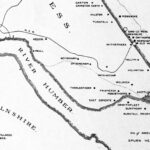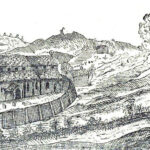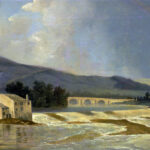29 March 1461: The Wharfe runs red as the Yorkists destroy the Lancastrians at Towton (Tadcaster)

The initial deployment at the Battle of Towton (Jappalang 2011).
Edward Hall. 1809. Hall’s Chronicle. London: J. Johnson. Get it:
.Unedited excerpt
If an excerpt is used in the book, it will be shorter, edited and, where applicable, translated.
So the same day about 9 of the clock, which was the 29 day of March, being Palm Sunday, both the hosts approached in plain field between Towton and Saxton. When each part perceived other, they made a great shout, and at the same instant time there fell a small snyt or snow, which by violence of the wind was driven into the faces of them which were of King Harry’s part. The Lord Falconbridge [Fauconberg – William Neville, 1st Earl of Kent], which led the forward of King Edward’s battle, being a man of great policy and of much experience in martial feats, caused every archer under his standard to shoot one flight and then made them to stand still. The northern men, feeling the shot, but, by reason of the snow, not well viewing the distance between them and their enemies, like hardy men shot their sheaf of arrows as fast as they might, but all their shot was lost, for they came not near the southern men by forty tailor’s yards. When their shot was almost spent, the Lord Falconbridge marched forward with his archers, which not only shot their own sheaves, but also gathered the arrows of their enemies and let a great part of them fly against their own masters. The Earl of Northumberland and Andrew Trolope, which were chieftains of King Harry’s vanguard, seeing their shot not to prevail, hasted forward to join their enemies. The battle was sore fought, for hope of life was set aside on every part, and taking of prisoners was proclaimed as a great offence, by reason whereof every man determined to conquer or die in the field. This deadly battle continued ten hours in doubtful victory, the one part sometime flowing and sometime ebbing ; but in conclusion King Edward so courageously comforted his men, that the other part was overcome and fled toward Tadcaster Bridge to save themselves: but in the mean way there is a little brook called Cocke, not very broad, but of great deepness, in the which a great number were drent and drowned, in so much that common people there affirm that men alive passed the river on dead carcases, and that the river of Wharfe, which is the great sewer of the brook, was coloured with blood.
Comment
Comment
Something to say? Get in touch
Similar
 22 September 1465: A menu for the enthronement at Cawood Castle of George Neville as Archbishop of York
22 September 1465: A menu for the enthronement at Cawood Castle of George Neville as Archbishop of York 3 May 1343: Short of cash for his French wars, Edward III asks what the effect on his rental income will be of January storms and coastal erosion at Ravenser Odd (Holderness)
3 May 1343: Short of cash for his French wars, Edward III asks what the effect on his rental income will be of January storms and coastal erosion at Ravenser Odd (Holderness)
Comment
Comment
I haven’t read much about the Yorkshire Baptists, but Israel Roberts writes:
In my mother’s early days [born 1802], the Baptists used to baptise their new converts in [Bagley] Beck, which then, of course, ran with pure clean water.[ref]Strong: Farsley’s first Baptist Chapel was built adjacent to Bagley Beck in 1777.[/ref] I can remember very well when it was the custom to baptise in the River Aire at Newlay Bridge (Roberts 2000).
I think that Wroe’s choices of Idle and 40 days and 40 nights were designed to echo the Temptation of Christ and his baptism by John the Baptist. Here’s Matthew 4 (KJV):
[1] Then was Jesus led up of the Spirit into the wilderness to be tempted of the devil.
[2] And when he had fasted forty days and forty nights, he was afterward an hungred.
[3] And when the tempter came to him, he said, If thou be the Son of God, command that these stones be made bread.
[4] But he answered and said, It is written, Man shall not live by bread alone, but by every word that proceedeth out of the mouth of God.
[5] Then the devil taketh him up into the holy city, and setteth him on a pinnacle of the temple,
[6] And saith unto him, If thou be the Son of God, cast thyself down: for it is written, He shall give his angels charge concerning thee: and in their hands they shall bear thee up, lest at any time thou dash thy foot against a stone.
[7] Jesus said unto him, It is written again, Thou shalt not tempt the Lord thy God.
[8] Again, the devil taketh him up into an exceeding high mountain, and sheweth him all the kingdoms of the world, and the glory of them;
[9] And saith unto him, All these things will I give thee, if thou wilt fall down and worship me.
[10] Then saith Jesus unto him, Get thee hence, Satan: for it is written, Thou shalt worship the Lord thy God, and him only shalt thou serve.
[11] Then the devil leaveth him, and, behold, angels came and ministered unto him.
Let’s speculate wildly:
- Stones into bread. 19th century quarrying at Idle/Wrose/Eccleshill, though valuable for quarry owners and workers, and for the builders of Bradford, had a devastating effect on (public access to) the hillsides. “Suffice to say that, near Bradford, good stone was cheap, and good eyes were rare; and that, except in the time of the rich corn harvests, what was Eccleshill Moor is now a hideous sight.” (Anon 1852) Wroe’s anti-industrial line was that man shall not live by bread alone: what about bilberries?!
- Pinnacle of the temple. More thought required.
- Mountain. The trig point on Eccleshill is at 212.244m. The views would have been 360º stupendous before mass housebuilding, and, while dodging the dog poo, you still get marvellous glimpses of Ilkley Moor, Airedale etc. But, like Jesus, Wroe affected a rejection of worldly dominion.
- Ministered to by angels. Wroe believed, and managed for a while to convince his followers, that young girls were his just reward for withstanding the Devil’s temptations:
“Seven books – seven writers will I have – seven virgins temporal and spiritual; and until seven be found I will not cease my work.” Written from John Wroe’s mouth by William Tillotson. See how this has been fulfilled in part by the shepherds of the house of Israel agreeing to accuse John Wroe of unlawful actions, in the 10th month, 1830; which caused many of the flock who were then gathered to be scattered again; and on the 11th of the 4th month, 1831, at Bradford, when he was trodden under foot, and had three of his ribs dislocated (Wroe 1851).
One Jane Rogers has novelised these later events:
John Wroe, prophet of the apocalyptic Christian Israelite Church, made his headquarters in Lancashire in the 1820s. When God told him to comfort himself with seven virgins, his congregation gave him their daughters. Each woman in Wroe’s household, from brutalised Martha to saintly Joanna, has her own secret hopes of a new life – either in heaven or on earth – at a point in history when anything seems possible. And each has her own view of the prophet. Mr Wroe’s Virgins tells the story of the nine months of their life together, until accusations of indecency, and the trial that follows, bring Wroe’s household to a dramatic end (Rogers 2011).
Wroe surely improves dramatically, if not theologically, on Jesus by being baptised after his temptations rather than before. How does Joanna Southcott score in the Prophet Rankings?
The Quakers also number, rather than name, their months.
Something to say? Get in touch
Search
Donate
Music & books
Place-People-Play: Childcare (and the Kazookestra) on the Headingley/Weetwood borders next to Meanwood Park.
Music from and about Yorkshire by Leeds's Singing Organ-Grinder.




 Bluesky
Bluesky Extwitter
Extwitter